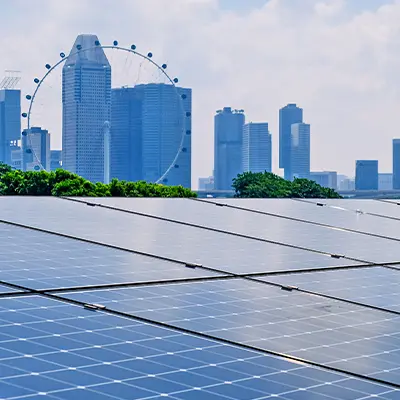Being green is often seen as a business cost. While the environmental and social benefits of sustainability best practices are plain to see, the financial and economic gains may not be so evident at first glance. But Singapore is betting that by accelerating its green plan, it will spark a multiplier effect that will create significant growth and job opportunities.
In a study commissioned by Enterprise Singapore and the Economic Development Board of Singapore, it is estimated that the economic opportunities from carbon services could create a projected gross value added (GVA) of between US$1.8 billion to US$5.6 billion in Singapore by 2050. The range is wide as the carbon market is still evolving.
Unlike many countries which are hesitant about their climate change goals or have delayed green plans as the Covid-19 pandemic puts a strain on national coffers, Singapore is moving in the opposite direction. Last Friday (Feb 18), Finance Minister Lawrence Wong sped up the country's ambition to achieve net zero emissions by or around 2050, instead of "as soon as viable in the second half of the century".
To achieve the new net-zero ambition, the current carbon tax of S$5 a tonne of emissions will be raised to potentially S$80 a tonne by 2030 - a cost that is deemed "beyond breaking point" by Timothy Colyer, partner, Financial Services at Oliver Wyman. At that rate, laggards in the brown industries and those unprepared for green transition will certainly hurt.
Yet Wong is prepared to take the bull by the horns. The idea is for companies to expedite their green transition and invest in clean technologies. They can, from 2024, also surrender high-quality international carbon credits to offset up to 5 per cent of their taxable emissions. This, in turn, should scale up the markets for carbon offsets.
Beyond the larger compliance market, where companies are obligated to buy allowances for emissions above a certain mandated threshold, there is a huge opportunity in the nascent voluntary market. Here, individuals, companies, or governments purchase carbon offsets to mitigate their own greenhouse gas emissions from transportation, electricity use, and other sources.
Refinitiv estimates the total compliance carbon market size was US$261 billion in 2020. In contrast, the voluntary carbon market is smaller, at US$400 million. However, the latter is projected to grow exponentially to US$10-25 billion by 2030, depending on how aggressively countries pursue their climate change targets.







